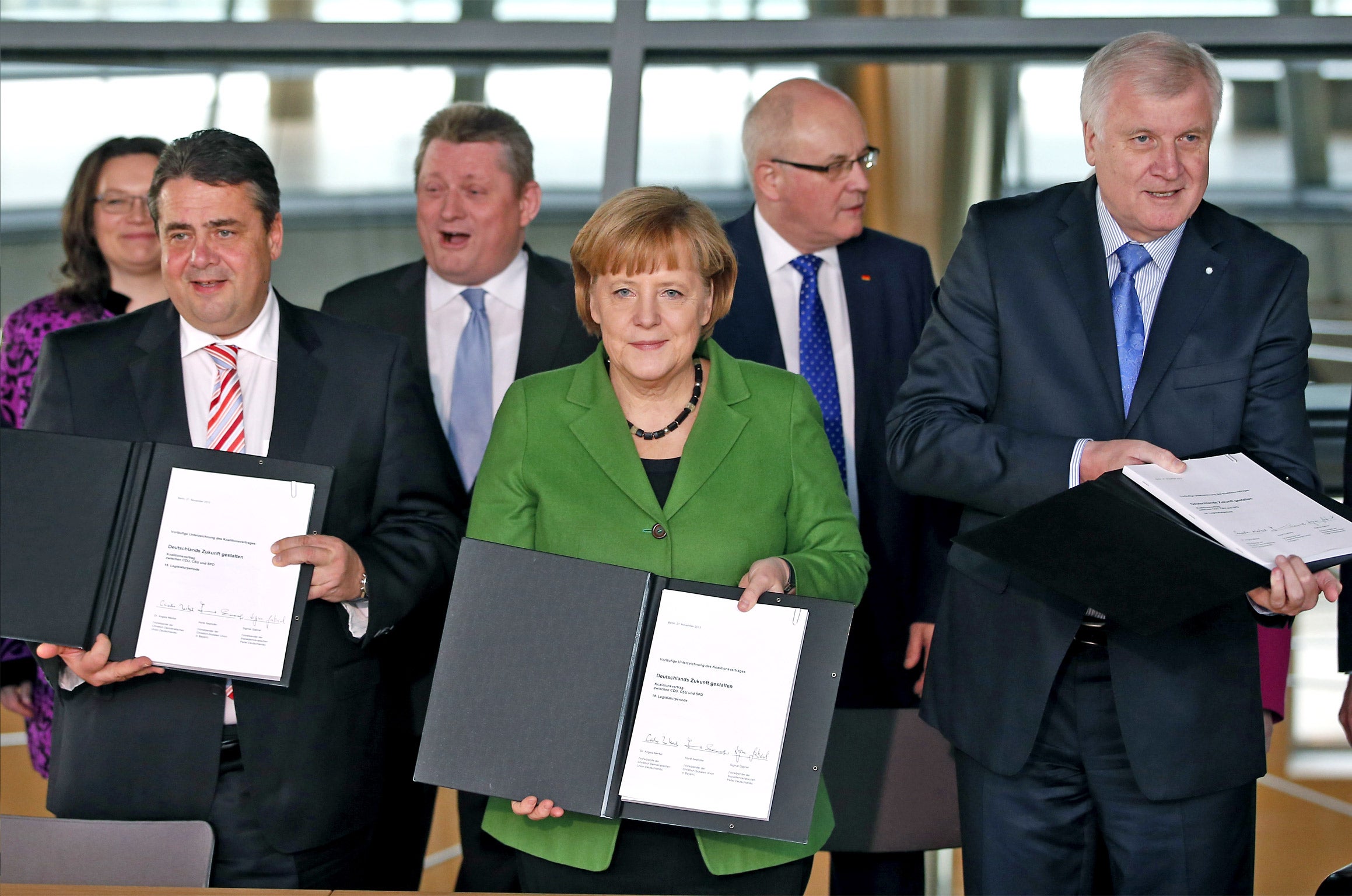Two months after election win in Germany, Angela Merkel forms coalition
Agreement with arch-rivals means introduction of minimum wage but higher taxes are ruled out

Angela Merkel will return as German chancellor for a third term after she hammered out a coalition deal with her old Social Democrat (SPD) opponents that rolls back decade-old reforms of the welfare state but preserves Berlin’s strict approach towards its struggling European partners.
The agreement, spelled out in a 185-page policy document entitled “Shaping Germany’s Future”, was struck two months after Ms Merkel’s conservative Christian Union (CDU/CSU) emerged victorious from an election but fell short of a parliamentary majority. Its traditional coalition partner, the Free Democrats (FDP), won no seats, leaving Ms Merkel to look for a new partner in the Bundestag.
The 59-year-old pastor’s daughter from eastern Germany was forced to negotiate with her arch-rivals in the SPD, with whom she ruled in an awkward “grand coalition” during her first term between 2005 and 2009.
The SPD is still smarting from that experience and its leadership has agreed to put the new deal to a vote of the party’s 474,000 card-carrying members, adding an element of uncertainty to Ms Merkel’s goal of having a new government in place by Christmas.
“We entered negotiations with very different ideas and that is why things took a little time,” Ms Merkel told a news conference, sitting between the SPD chairman, Sigmar Gabriel, and Horst Seehofer, leader of the Bavarian Christian Social Union. Mr Gabriel said he was sure a “broad majority” of SPD members would back the deal in a postal vote, the results of which are due on 14 December.
All three politicians praised the atmosphere in the talks, with Mr Gabriel and Mr Seehofer joking with reporters about whether they could now address each other with the informal du in place of the formal sie.
The deal was greeted with a sigh of relief by investors, who pushed the euro to a four-year high against the Japanese yen and a one-month peak versus the US dollar. It was also welcomed by officials in Brussels and other European capitals. The lengthy talks have delayed movement on major European reforms, including progress on banking union, an ambitious project designed to prevent a recurrence of the eurozone’s crippling debt crisis.
“It’s positive news,” the Italian Prime Minister, Enrico Letta, said in Rome. “There’s a need for a German government as soon as possible.”
Ms Merkel stood firm against SPD demands for tax increases for the rich, but to clinch the deal she agreed to introduce a minimum wage of €8.50 (£7) per hour, which some economists have warned could push up unemployment. To reduce that risk, the parties agreed to phase it in over several years, with exceptions allowed until 2017.
The SPD also secured concessions from Ms Merkel on pensions and labour market rules, softening elements of reforms introduced a decade ago by Ms Merkel’s predecessor as Chancellor, Gerhard Schröder of the SPD. In the future, people who have worked for 45 years can earn full pensions from 63, four years earlier than the statutory 67-year threshold. The use of temporary workers by German firms will also be restricted to 18 months under the deal.
Hopes in France and other eurozone states that the SPD might convince Ms Merkel to adopt bolder measures to stimulate growth and tackle unemployment were dashed in an deal that endorsed her carrot-and-stick approach to the euro crisis. The coalition deal ruled out all forms of debt mutualisation.
Reuters
Subscribe to Independent Premium to bookmark this article
Want to bookmark your favourite articles and stories to read or reference later? Start your Independent Premium subscription today.

Join our commenting forum
Join thought-provoking conversations, follow other Independent readers and see their replies